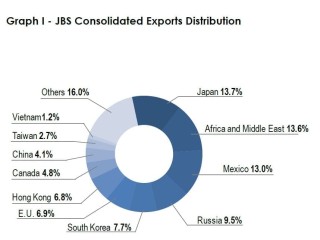 Rising costs in Australian meat processing impacted by Government fees and charges were singled out for mention when the world’s largest beef processor, JBS SA, delivered its second quarter 2011 results this week.
Rising costs in Australian meat processing impacted by Government fees and charges were singled out for mention when the world’s largest beef processor, JBS SA, delivered its second quarter 2011 results this week.
JBS, the world's largest beef processor and parent company of JBS Australia, posted a net loss of about A$108.2 million in the second quarter, reversing net gains from a year earlier and the first three months of the 2011 year.
The company's earnings report staged in Brazil attributed the drop to an A$122m negative quarterly loss in its Pilgrim's Pride division, the largest chicken producer in the US, and poor performance in its US beef division, which includes the Australian processing operations.
JBS said all its business units had revenue growth in local currency terms year-on-year, reflecting an increase in overall average prices and strong demand in emerging countries. But the company's earnings before interest, taxes, depreciation and amortisation was down 41.2pc from the same quarter a year earlier and 29.7pc less than the previous quarter.
On a brighter side, JBS's sales revenue across its global operations during the first six months of 2011 totalled BRL29.3 billion, up 19pc from the first half of last year. Every business unit achieved double-digit sales growth in the first half.
The company’s USA Beef (including Australia) division delivered 43pc of the overall company’s net revenue for Q2 of A$3774m, up 19.1pc on the first quarter, reflecting an increase in average sale prices. The revenue increase was up 4.5pc from the previous quarter. Within the US division, poultry sales grew 15pc during the quarter to A$3.7b; pork sales reached A$1.6b, up 21pc; and beef revenues rose A$7.42b, up 26pc.
 Earnings reached A$42.6m for the period, a decrease of 77.1pc and 83.4pc over 2Q10 and 1Q11, respectively.
Earnings reached A$42.6m for the period, a decrease of 77.1pc and 83.4pc over 2Q10 and 1Q11, respectively.
JBS does not separate results for its Australian and US operations in its quarterly financial disclosures.
JBS executive president Wesley Batista said the results for the quarter reflected difficulties encountered by the JBS Australian operations, primarily due to a strong A$ and the impact of the mark-to-market hedge structure for the long position on cattle in the US, which depreciated significantly in the quarter due to the drought that hit the southern US and the resulting increase in the supply of cattle for slaughter.
Besides suffering from currency appreciation, operations in Australia faced other challenges like the increase in collections by the Government, the carbon tax project and the increase in labour costs without any corresponding increase in productivity, Mr Batista said.
In contrast, he said the weakness of the US$ was making US beef prices very competitive.
“Some cuts the US can sell cheaper today in Brazil than in Russia, the Middle East and other markets.”
Mr Batista said he believed JBS’s US operations would have enough cattle to run its US beef plants in the third and fourth quarters at the same level they were running at today, despite concerns of a cattle shortage due to widespread drought across southern US states. He did not mention supply prospects beyond the next five months, however.
He reiterated to Brazilian reporters that JBS isn't interested in property acquisition for the foreseeable future, and wants to focus instead on improving synergies within the company.
Analysts suggested JBS's expansion into the US turned sour when a wrong bet on cattle prices in America, and losses in chicken operations, overpowered a firm performance in South America to drag the group into the surprise loss for the second quarter.
While investors had been prepared for ‘underperformance’ within the JBS-controlled Pilgrim’s Pride chicken operation which last month unveiled a quarterly loss, the Brazilian group also unveiled a hit from being caught-out by the southern US drought.
JBS revealed last week that BNDES, Brazil's national development bank, had converted loans with a face value of R$3.48bn into shares, resulting in a jump from 17pc to 30.4pc, in its stake in the beef group. The stake of JBS's ruling Batista family has fallen to 47pc from nearly 55pc.
Also this week another leading Brazilian meat processor, Marfrig, returned a similar performance posting a second quarter net loss. A company spokesman said Marfrig would focus on cost reduction and capturing synergies from recent acquisitions.
Cattle costs in its South American beef sector created ‘a challenging environment’ forcing the closure of abattoirs in Brazil and Uruguay, the company said.
